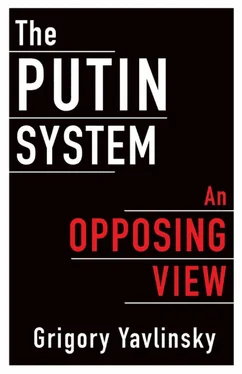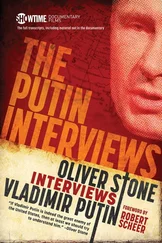Nonetheless, the ruling circle do not necessarily need to have total, comprehensive, and all-encompassing control over these media outlets. Unlike totalitarian systems, which seek to assert complete dominance over the minds of the people, authoritarian systems do not set such grandiose goals for themselves. In their set of priorities, the principal task of their policies with regard to the channels of mass communication is to preclude the possibility that other groups—their potential rivals in the struggle for power and influence—might use these channels in the pursuit of their own goals, which may be incompatible with those of the ruling circle.
Preventing this does not require that the rulers try to reeducate society in line with some coherent value-based ideology. It is enough to infuse society with the sense that there is no alternative to the status quo and that this status quo is not, so to speak, jeopardizing their future. In other words, it is enough to persuade the bulk of the population that the present order is natural and acceptable, while the opposition’s promises of something better, more just, or more efficient is empty talk that comes from an evil source.
To ascertain this, one may just look at the content of the government-controlled media production and compare it with, for example, that of Soviet times. In contrast to Soviet-era media, today’s main government-controlled TV channels do not attempt to lecture the people about what to believe and how to behave. The national TV shows with the largest audience share today would not have passed the filter of Soviet-era censorship, not only on political and ideological but also on ethical and aesthetic grounds. Even the so-called political broadcasting mostly contains almost no positive messaging at all. Its only function is to discredit any alternative whatsoever to the powers that be. This is achieved by portraying other contenders for power as at least as selfish as its present holders but also socially (or ethnically) alien to most of the population.
One way or another, all the media governed by the ruling circle feed their consumers with two principal messages. The first is that nothing that is happening in the country is extraordinary or destabilizing; the status quo is here to stay, and everything that is going on is under control and will not end up in anything catastrophic. The second message is that there is no alternative whatsoever to the current state of affairs and that anybody who says the opposite is either a liar, a foreign mercenary—in either case, a disgusting and completely selfish creature—or, in rare cases, an absolutely naive daydreamer who has lost all touch with reality.
At the same time, outside of the framework of the political duties assigned to the relevant media, there is unrestricted space for a full diversity of opinion—all the way to its most preposterous forms and expressions, which undermine the very basics of human coexistence in society. And, of course, the existence of the media’s political requirement does not preclude the freedom of commercial activities, which in most instances is accepted as a given, implying that the managers of Kremlin-controlled mass media are expected to use their power for personal enrichment and prosperity. Moreover, the rapid enrichment of these media managers at the expense of the government as the owner of these major media channels is, for all intents and purposes, welcomed by the ruling circle, and at times even initiated by it, as a reward for the managers’ loyalty and readiness to serve the rulers without any compunction.
Granted, the stream of media messaging set in motion by these manipulative tools does not produce a large mass of authentic supporters of the ruling circle. Yet it performs another, much more important function. Namely, it inculcates the huge mass of Russians with the sense that there is no other kind of life beyond the media agenda that is being imposed on them, that any alternative whatsoever to the political realities of the present is just an inferior replica of the status quo, and that the lies and hypocrisy in the media’s portrayal of reality is not a deviation but rather a universal fixture of civic and political activities as such.
Let me reiterate: this way of managing mass media cannot secure society’s active support for the ruling circle. But, most importantly, it does ensure a societal attitude of scornful indifference toward any attempts to secure support for any group or team seeking to a become a political alternative to the ruling circle. And, in terms of safeguarding the existing system of rule in present-day Russia, general passivity, skepticism, and indifference toward politics guarantees stability better than explicit support by socially active groups of the population. This is so, in part, because enthusiastic public support must be constantly fueled by tangible successes and achievements, whereas maintaining an attitude of indifference and the sense that real changes in the country are impossible to achieve does not require excessive effort or expenditure.
Clearly, this way of governing the country yields satisfactory results only under relatively stable conditions, absent any external shocks or unmanageable domestic crises. These kinds of tools may be useful in averting small-scale trouble or tackling short-term challenges to authoritarian rule, but they are hardly helpful against major destructive, destabilizing forces. The tools make it more or less possible to cope with tactical problems in the short term, yet the state remains powerless in the face of strategic threats and powerful destructive trends, both internal and external. Society’s dismissive attitude toward all political rhetoric neutralizes and emasculates every criticism of the authorities, making it impossible to remove specific individuals from power against their will. But these public attitudes also make it impossible for the authorities to survive truly critical conditions by mobilizing public support and obtaining cooperation from society. To the contrary, under such conditions, the masses will tacitly enjoy seeing the authorities’ failure in a crisis situation, even if society as a whole suffers in the process. The instruments used to suppress societal threats to the authorities may work relatively well under a system that is sustained by the inertia of an orderly everyday life, yet they become powerless and unusable in the face of mass protracted challenges to the status quo. Nevertheless, at this time, the instruments used to sustain the Kremlin’s monopolistic grip on power has been fully formed and is relatively effective in serving its purposes, from the point of view of the members of the ruling circle.
ELECTIONS WITHOUT A CHOICE
Within any authoritarian system of governance, by definition, elections are not intended to be used as an instrument to determine which group of people will gain access to the levers of governance. In such a system, the ruling circle as the highest authority is permanently in power as a matter of principle. Though the composition of this circle may—and is even bound to—change over time, internal personnel modifications are made by their always stable core membership and are never submitted for approval by anybody outside of that group.
Within institutions and agencies that compose the government bureaucracy, both in its narrow and in its broad sense, senior executive staff is filled through appointments by the higher-ups. The only possible exception to this rule is at the lowest layer of the government apparatus. Heads of local self-government in the municipalities are still elected by the people, but they have no significant resources or power. That is, essentially all personnel changes, even those that are not planned in advance and that occur by necessity, are handled internally by the vertical hierarchy of power, without seeking any consent whatsoever from other groups that may aspire to positions of governmental power. In this system of governance, elections are either not held at all or are merely a facade, used to give an official status to the personnel decisions that have already been made, as if stamping them with “public approval.”
Читать дальше












